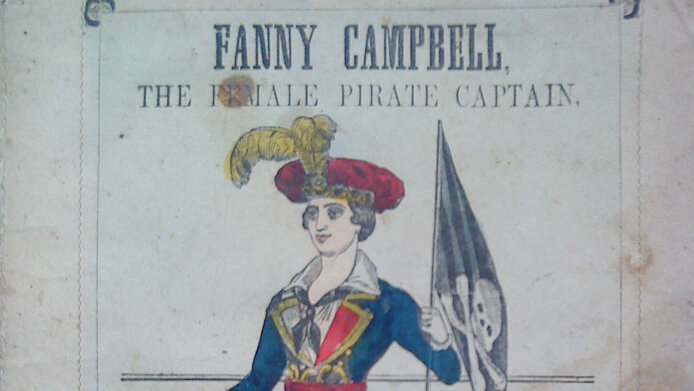Captured pirates: The pirate figure on the banners of various ideologies

Literature and popular culture are full of references to pirates as revolutionary adventurers and criminals prepared to use violence. The traditional portrayal of a character with a wooden leg, bandana and a parrot hides the complexity of the figure. This is because the outward appearance often conceals contradictory views of national, cultural and gender-specific identity. The figure of the pirate is therefore now the subject of a more in-depth literary examination as part of a project conducted at the Department of English and American Studies of the University of Vienna.
Outlawed like Jack Sparrow
The project takes as its starting point the situation during the golden age of piracy in the late 17th century. This was a time when the political and social situation of the European colonial powers and the future United States was characterised by great turmoil and crisis. Alexandra Ganser, who heads the project, explains: "At that time, from a legal perspective, the pirate was seen as an intangible subject for national laws, as an outlaw. During an era of newly discovered and fiercely contested territories and colonies, this special status made the pirate a popular figure. His spirit was frequently invoked to justify people's own ideas about the legitimacy of possessions, territories and their populations."
This project is now examining how major political and social crisis scenarios are discussed in the literature on piracy. One of the first of these scenarios is the discovery of America itself. The literature from around 1700 often presents pirates as explorers and their plundering as valuable contributions to the European empire of knowledge. The crisis of the separation from the British Crown to the Declaration of Independence is also reflected in the portrayal of pirates as heroic, patriotic fighters, another focus of the study.
The pirate, however, also had negative associations, for example in the portrayal of England as a pirate, who tries to deny America its natural right to independence. The aim of the study, which has already begun, is to determine how the figure of the pirate serves to underpin and legitimize various political views. The project will also look at the subject in a present-day context: it aims to show how piracy is linked to issues of intellectual property and copyright infringement, for example, or with unconventional political parties.
Textual undercurrents
The methodological approach used, known as "contrapuntal" reading, allows Ganser to read the texts in a different way. Its focus is the diversity of voices in the text, thereby uncovering the subtle work of the prevailing ideologies in a work of literature. "For some critics, the pirate is the excessive big spender, hungry for profit and therefore the prototypical capitalist and colonialist. Other schools of thought present the pirate as an advocate of alternative lifestyles and radical democracy and equality: Pirate communities are seen as micro-societies, where ethnical, social and gender differences are considered to be unimportant," says Ganser.
The FWF project shows how research in social and cultural studies facilitates the decoding and classification of attitudes hidden behind texts and figures considered to be familiar. The complex meaning of such texts for the formation of a national and cultural sense of belonging demonstrates the importance of the literary and cultural imaginary for society at large.
Personal details
Alexandra Ganser works at the Department of Englisch at University of Vienna. Her research interests are Cultural studies, cultural theory, and American popular culture through the centuries, with a focus on transatlantic pirate narratives; Mobility studies, transatlantic American studies & the Black Atlantic, Gender Studies, Visual Cultures and Intermediality, Native American Studies and Eco-criticism and scientific discourse. She was granted a Elise Richter Fellowship by the Austrian Science Fund FWF.
The basic research project takes as its starting point the situation during the golden age of piracy in the late 17th century. This was a time when the political and social situation of the European colonial powers and the future United States was characterised by great turmoil and crisis.





